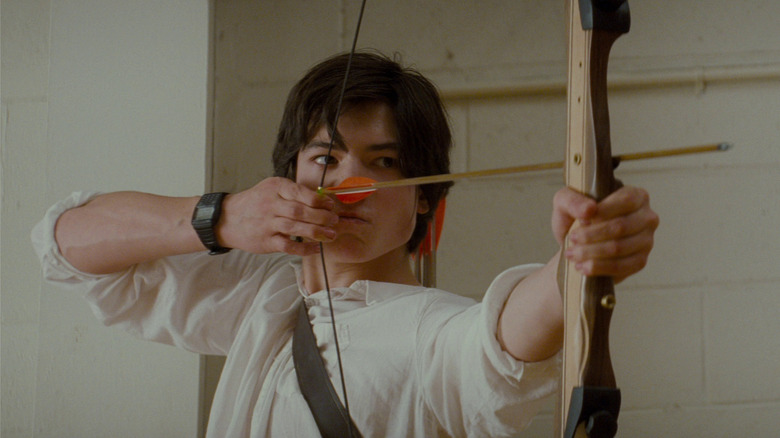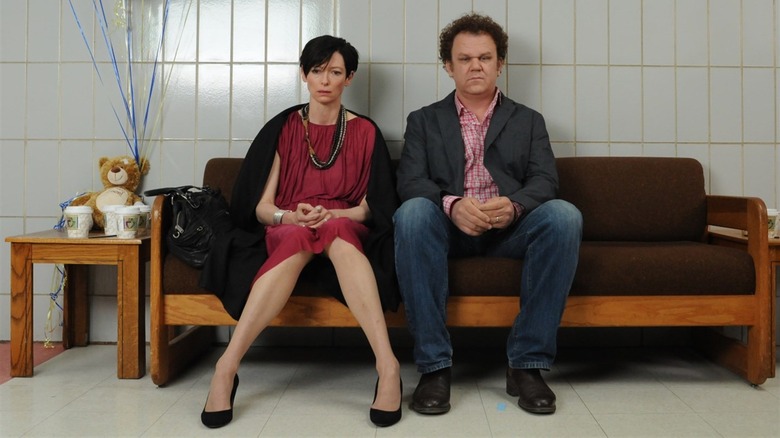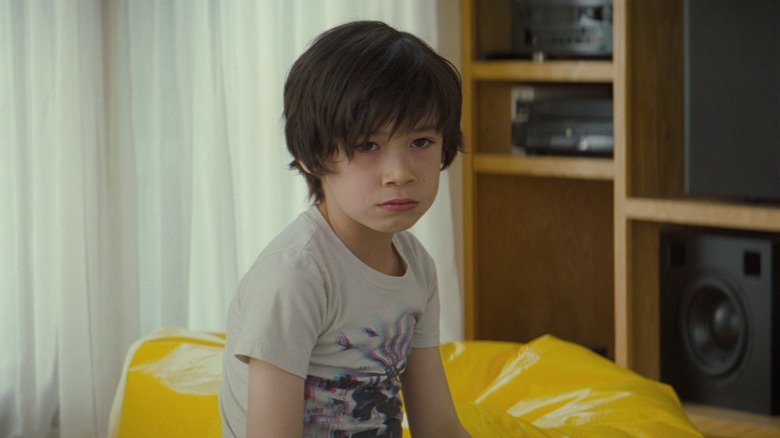The Ending Of We Need To Talk About Kevin Explained
Near the top of the list of the worst movies to watch on Mother's Day is "We Need to Talk About Kevin." Based on Lionel Shriver's 2003 bestseller of the same name, Lynne Ramsay's 2011 film explores a broken family, mental illness, and the aftermath of a tragedy. It asks, "who is to blame when something horrific happens?"
Eva Khatchadourian (Tilda Swinton), a former travel writer, gives up her life of adventure when she becomes pregnant. Ambivalent toward motherhood, Eva struggles to care about her increasingly cruel son, Kevin (Ezra Miller). Her husband Franklin (John C. Reilly) dismisses her concerns and uproots their bustling city life for a quiet home in the suburbs.
Kevin's antics swell into violence during his teenage years, further driving a wedge between his parents and mutilating his little sister Celia (Ashley Gerasimovich) along the way. His final act of brutality — a school massacre in addition to murdering his father and sister — destroys any semblance of normalcy for Eva. The film ends with the emotionally blank mother visiting her son on the second anniversary of his crimes, just before he's transferred to an adult prison.
Eva finally asks why he did it. With his shaggy hair buzzed off and scars covering his pale face, Kevin avoids her eyes and replies, "I used to think I knew. Now I'm not so sure." The two embrace, and then she walks away.
So, what did that exchange mean for the Khatchadourians?
Nature vs. nurture
Psychology Today describes the "nature vs. nurture" debate as questioning how both elements impact a person's characteristics. Nature refers to how they were born, while nurture refers to how they were raised. "We Need to Talk About Kevin" leans into that debate, showcasing a resentful mother, a passive father, and a child with an untreated mental illness.
Of course, that mental illness is presumed by viewers. Eva and Franklin never seek psychiatric help for their son; they can't talk about Kevin without fighting. Does their parental neglect make them culpable for the lives he took? Does Eva's open contempt for Kevin drive him to darkness?
From the beginning, Eva is detached from motherhood. Kevin is a defiant baby who screams incessantly but never around Franklin. He grows into a spiteful toddler, refusing to say "mommy" and egging on her frustrations. At one point, she mockingly coos at him, "Mommy was happy before little Kevin came along. Now, mommy wakes up every morning and wishes she was in France!"
Did Kevin internalize her hatred of him, or is she just feeding into his innate instability? He's aware of her feelings toward him, and throughout the film, points them out. On one prison visit, he describes her throwing him at a wall and breaking his arm as "the most honest thing you ever did."
Their tumultuous relationship goes from annoyance over his smashing jammy bread onto the coffee table to feelings of fear after he stuffs the family pet down the garbage disposal. Neither parent punishes him or seeks outside help, leaving him to his own devices. Did they create a monster, or was he born that way? Would any interference have prevented him from becoming a killer? Was he acting out to punish Eva?
What's next for Eva?
The ending of the film leaves Eva's fate up in the air. She has something of an answer as to why Kevin committed such terrors, but where does that leave her? Will she continue living in their hometown, where she's harassed by locals who blame her for the deaths? Is it possible for her to move on from something so traumatic?
She mentions that she believes he'll be released in five years. She could move away for a fresh start, but she's shown setting up a room for him, complete with his navy blue bedding and Robin Hood book. Is she channeling the brief moment of affection between the two when he was young and sick, or is she working toward being a better mother upon his release?
Her public perception is unlikely to change, but Eva appears firm in her choice to stick around for Kevin's sake. Not that she has a ton of options — she struggles to find work and be accepted by those around her. She lives with the guilt of what her son did, on top of the guilt of knowing she did nothing about the various warning signs.
While the film isn't as explicit as the book, both versions of Eva are grappling with Kevin's final answer as they wonder if it's even worth feeling weighed down by the question of responsibility. "At the end of the day, I have no idea, and that pure, serene, ignorance has become, itself, a funny kind of solace," she writes in a letter to her deceased husband.
The intentional ambiguity of the book
The source material for "We Need to Talk About Kevin" was purposely crafted to leave readers wondering who was responsible for the massacre. When asked about the film adaptation in an interview with The Guardian, Shriver said her biggest concern was if they'd be able to "capture the quality of the slightly unreliable narrator and the ambiguity over who is to blame."
As with any book-to-film adaptation, some of the nuances were lost in translation. However, the story's unflinching refusal to provide answers for who was responsible carries over. Shriver welcomes the sharply divided interpretations, writing in the Harper Perennial P.S. edition that "We Need to Talk About Kevin" asks an explicit question, "Yet I hope that this question is no more resolved in the book than crude oppositions like 'nature vs. nurture' are ever reconciled in real life."
Going on, she again asks the question of responsibility and says, "I don't know. You tell me." While Eva is shown throughout the film to be indifferent toward her son, Kevin's actions are fueled by his desire to spite her. It's a cyclical pattern, making it impossible to hold just one person accountable for everything.



